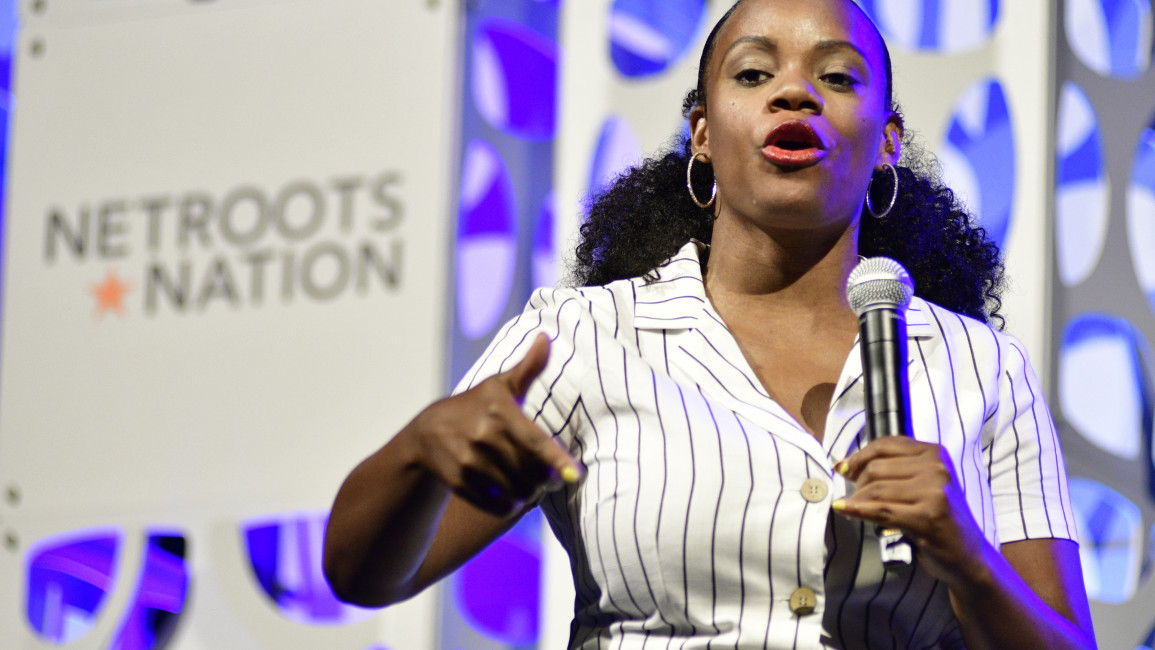Summer Lee supporters celebrate early US election win for AIPAC-attacked progressive candidate
Progressive candidate Summer Lee looks set to win a hard-fought race against her AIPAC-backed conservative opponent, Steve Irwin, for Pennsylvania’s 12th Congressional district with almost 95 percent of the votes counted.
On Wednesday morning, the day after the election, Democrat Lee tweeted: "Our victory shows that we can overcome the billionaire class that wants to divide and conquer us all with fear and lies-for-profit, if only we come together across our differences for a positive vision of multiracial democracy. We can have nice things, if we fight."
Her early win was celebrated by progressive candidates, including Bernie Sanders.
"Congratulations to @SummerForPA for her extraordinary grassroots campaign in Pennsylvania District 12 in which she defeated millions of dollars of right-wing super PAC money, as well as the Democratic establishment. Summer will be a great, progressive member of Congress," he tweeted.
Lee stood on a platform promoting environmentalism, public education, universal healthcare, and social justice - as well as support for workers', LGBTQ+, immigrant, and Palestinian rights - facing attack ads worth millions of dollars from super PACs.
Among her most fervent opponents were pro-Israel PACs, mainly funded by AIPAC, with more than $3 million spent on ads targeting Lee, according to The Intercept.
This appears to be part of wider efforts to stifle Democratic progressives, particularly those who have been outspoken on Palestinian rights.
We won. pic.twitter.com/8LXA4dcuOn
— Summer Lee (@SummerForPA) May 18, 2022
Also targeted by super PACs were Nida Allam and Erica Smith in North Carolina, both of whom lost. Jamie McLeod-Skinner in Oregon, whose race has still not been called as of Wednesday evening, was another target of PACs.
In April, prior to the height of the super PAC efforts, some polls had Lee in the lead by more than 20 points ahead of her opponent, Steve Irwin.
By election night, it had become a toss-up, with the two candidates pulling ahead of the other every few minutes.
At the end of the night with 94 percent of the votes counted, Lee took a narrow lead with 41.7 of the vote, compared to Steve Irwin on 41.5 - just 446 votes.
Waleed Shahid, a progressive Democratic strategist, tweeted the day after the primaries: "When people get mad that @justicedems isn't involved in every primary, just remember we don't have the capacity or budget for it. We would have loved to get involved for Nida and others, but we simply just need more resources. We're being hit on all sides."
Shahid was commenting on complaints that Justice Democrats, a grassroots PAC, have not been supporting all progressive races. The reality, they say, is that their budget is only a fraction of those allocated to other Democratic groups, and an even smaller figure than those of super PACs.
A similar frustration for progressives came up in an Ohio primary race in August and then with the same outcome earlier this month, when Nina Turner, who campaigned on a left-wing platform - including support for Palestinian human rights - faced a barrage of attack ads funded by pro-Israeli PACs. She lost twice to her more conservative Democratic opponent Shontel Brown.
Though progressive organisations said they wanted to help, they pointed at being outgunned by super PAC money.
While progressives had losses in Tuesday's primaries, those that did win showed that it's not impossible to go up against - and beat - PAC-funded candidates.


![President Pezeshkian has denounced Israel's attacks on Lebanon [Getty]](/sites/default/files/styles/image_684x385/public/2173482924.jpeg?h=a5f2f23a&itok=q3evVtko)



 Follow the Middle East's top stories in English at The New Arab on Google News
Follow the Middle East's top stories in English at The New Arab on Google News


